江苏省苏州市陆慕高级中学2020-2021学年高一上学期期中考试英语试题
2020-2021学年度高一上学期期中考试英语试卷及答案(含两套题)
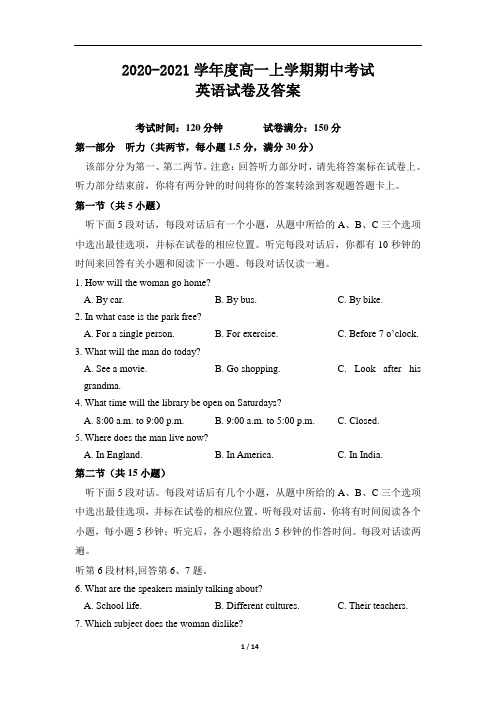
2020-2021学年度高一上学期期中考试英语试卷及答案考试时间:120分钟试卷满分:150分第一部分听力(共两节,每小题1.5分,满分30分)该部分分为第一、第二两节。
注意:回答听力部分时,请先将答案标在试卷上。
听力部分结束前,你将有两分钟的时间将你的答案转涂到客观题答题卡上。
第一节(共5小题)听下面5段对话,每段对话后有一个小题,从题中所给的A、B、C三个选项中选出最佳选项,并标在试卷的相应位置。
听完每段对话后,你都有10秒钟的时间来回答有关小题和阅读下一小题。
每段对话仅读一遍。
1. How will the woman go home?A. By car.B. By bus.C. By bike.2. In what case is the park free?A. For a single person.B. For exercise.C. Before 7 o’clock.3. What will the man do today?A. See a movie.B. Go shopping.C. Look after his grandma.4. What time will the library be open on Saturdays?A. 8:00 a.m. to 9:00 p.m.B. 9:00 a.m. to 5:00 p.m.C. Closed.5. Where does the man live now?A. In England.B. In America.C. In India.第二节(共15小题)听下面5段对话。
每段对话后有几个小题,从题中所给的A、B、C三个选项中选出最佳选项,并标在试卷的相应位置。
听每段对话前,你将有时间阅读各个小题,每小题5秒钟;听完后,各小题将给出5秒钟的作答时间。
每段对话读两遍。
听第6段材料,回答第6、7题。
6. What are the speakers mainly talking about?A. School life.B. Different cultures.C. Their teachers.7. Which subject does the woman dislike?A. History.B. English.C. Math.听第7段材料,回答第8、9题。
2020-2021学年高一年级上学期期中考试英语试卷-含解析
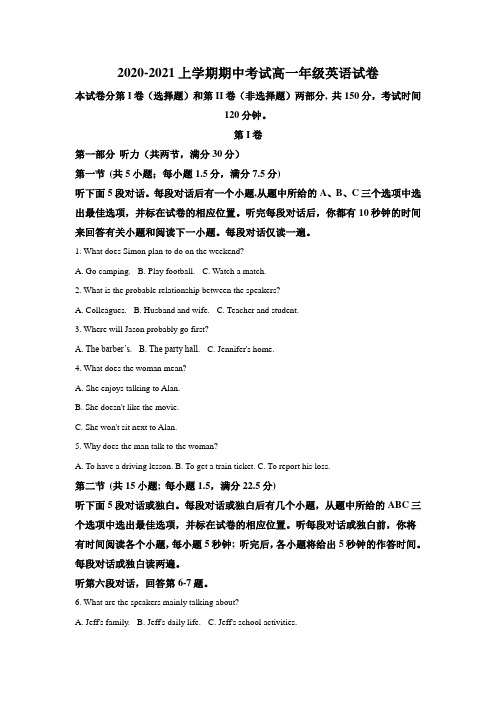
2020-2021上学期期中考试高一年级英语试卷本试卷分第I卷(选择题)和第II卷(非选择题)两部分, 共150分,考试时间120分钟。
第I卷第一部分听力(共两节,满分30分)第一节(共5小题;每小题1.5分,满分7.5分)听下面5段对话。
每段对话后有一个小题,从题中所给的A、B、C三个选项中选出最佳选项,并标在试卷的相应位置。
听完每段对话后,你都有10秒钟的时间来回答有关小题和阅读下一小题。
每段对话仅读一遍。
1. What does Simon plan to do on the weekend?A. Go camping.B. Play football.C. Watch a match.2. What is the probable relationship between the speakers?A. Colleagues.B. Husband and wife.C. Teacher and student.3. Where will Jason probably go first?A. The barber’s.B. The party hall.C. Jennifer's home.4. What does the woman mean?A. She enjoys talking to Alan.B. She doesn't like the movie.C. She won't sit next to Alan.5. Why does the man talk to the woman?A. To have a driving lesson.B. To get a train ticket.C. To report his loss.第二节(共15小题; 每小题1.5,满分22.5分)听下面5段对话或独白。
每段对话或独白后有几个小题,从题中所给的ABC三个选项中选出最佳选项,并标在试卷的相应位置。
2020-2021学年高一上学期期中考试英语试题(含答案)
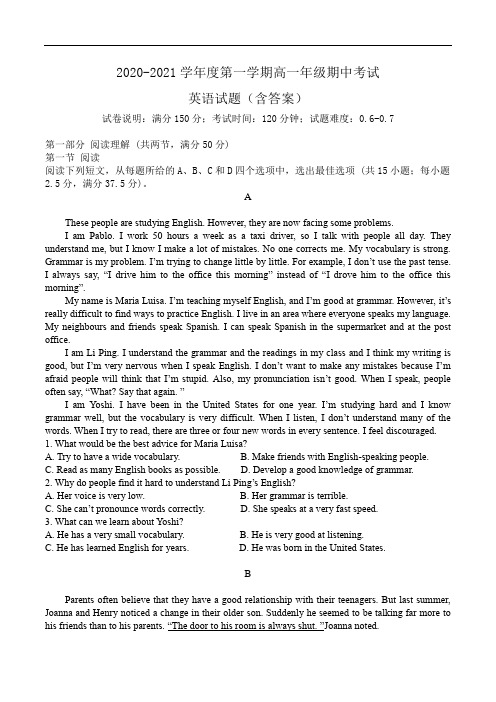
2020-2021学年度第一学期高一年级期中考试英语试题(含答案)试卷说明:满分150分;考试时间:120分钟;试题难度:0.6-0.7第一部分阅读理解 (共两节,满分50分)第一节阅读阅读下列短文,从每题所给的A、B、C和D四个选项中,选出最佳选项 (共15小题;每小题2.5分,满分37.5分)。
AThese people are studying English. However, they are now facing some problems.I am Pablo. I work 50 hours a week as a taxi driver, so I talk with people all day. They understand me, but I know I make a lot of mistakes. No one corrects me. My vocabulary is strong. Grammar is my problem. I’m trying to change little by little. For example, I don’t use the past tense.I always say, “I drive him to the office this morning” instead of “I drove him to the office this morning”.My name is Maria Luisa. I’m teaching myself English, and I’m good at grammar. However, it’s really difficult to find ways to practice English. I live in an area where everyone speaks my language. My neighbours and friends speak Spanish. I can speak Spanish in the supermarket and at the post office.I am Li Ping. I understand the grammar and the readings in my class and I think my writing is good, but I’m very nervous when I speak English. I don’t want to make any mistakes because I’m afraid people will think that I’m stupid. Also, my pronunciation isn’t good. When I speak, people often say, “What? Say that again. ”I am Yoshi. I have been in the United States for one year. I’m studying hard and I know grammar well, but the vocabulary is very difficult. When I listen, I don’t understand many of the words. When I try to read, there are three or four new words in every sentence. I feel discouraged.1. What would be the best advice for Maria Luisa?A. Try to have a wide vocabulary.B. Make friends with English-speaking people.C. Read as many English books as possible.D. Develop a good knowledge of grammar.2. Why do people find it hard to understand Li Ping’s English?A. Her voice is very low.B. Her grammar is terrible.C. She can’t pronounce words correctly.D. She speaks at a very fast speed.3. What can we learn about Yoshi?A. He has a very small vocabulary.B. He is very good at listening.C. He has learned English for years.D. He was born in the United States.BParents often believe that they have a good relationship with their teenagers. But last summer, Joanna and Henry noticed a change in their older son. Suddenly he seemed to be talking far more to his friends than to his parents. “The door to his room is always shut. ”Joanna noted.Tina and Mark noticed similar changes in their 14-year-old daughter. “She used to sit in my arms on the sofa and talk with me,” said Mark. “Now we joke that she does this only when she wants something. Sometimes she wants to be treated like a little girl and sometimes like a young lady. The problem is figuring out which time is which.”Before age 11, children like to tell their parents what’s on their minds. “In fact, parents are first on the list.” said Michael Riera, author of Uncommon Sense for Parents with Teenagers. “This completely changes during the teen years.” Riera explained. “They talk to their friends first, then maybe their teachers, and their parents last.”Parents who know what’s going on in their teenagers’ lives are in the best position to help them. To break down the wall of silence, parents should create chances to understand what their children want to say, and try to find ways to talk and write to them. And they must give their children a mental (思想的) break, for children also need freedom, though young. Another thing parents should remember is that to be a friend, not a manager, with their children is a better way to know them.4. “The door to his room is always shut. ” suggests that the son ______.A. dislikes to open his doorB. begins to hate his parentsC. is always busy with his studiesD. keeps himself away from his parents5. What troubles Tina and Mark most?A. Their daughter isn’t as lovely as before.B. They can’t read their daughter’s mind exactly.C. They don’t know what to say to their daughter.D. Their daughter talks with them only when she needs money.6. Which of the following best explains “the wall of silence” in the last paragraph?A. Teenagers talk a lot with their friends.B. Teenagers talk little about their own lives.C. Teenagers do not talk much with their parents.D. Teenagers do not want to understand their parents.7. What can we learn from the passage?A. Parents are patient with their silent teenagers.B. Parents should try to understand their teenagers.C. Parents are unhappy with their growing children.D. Parents should have suitable ways to talk with their teenagers.CTwo weeks ago, a 5-year-old girl named Sunshine Oelfke emptied out her piggy bank (存钱罐) onto the living room floor and immediately started counting. Her grandmother, Jackie Oelfke, thought she was playing as she carefully lined up the coins, but then she saw the girl put the coins into a plastic bag and place it in her backpack.“That aroused my curiosity,” Jackie told CBS News. “Nobody messes with the piggy bank.” After observing Sunshine work a few minutes longer, Jackie decided to find out why the little girl broke into her savings.“What are you doing with that money?” Jackie asked her granddaughter.“I’m taking it to school,” Sunshine replied. The little girl finally stated the real reason why she needed the money. “I’m going to take it for milk money. My friend Layla doesn’t get milk—hermom doesn’t have milk money but I have. ”Jackie’s heart melted at Sunshine’s words. Choked with strong feelings, Jackie held her sweet granddaughter tightly in her arms.Last week, Jackie and Sunshine met with her teacher, Rita Hausher, and handed her the $30 that Sunshine had saved. There are 20 kids in Sunshine’s class and about half don’t get milk. It costs﹩0.45 a carton (纸盒). The total adds up to about﹩180 a month for every child in the class to have milk every day.After dropping Sunshine off at school, Jackie posted a tearful video on Facebook to explain her granddaughter’s plan. To her surprise, dozens of people offered to donate towards the cause. Within a week, Jackie raised more than $1, 000. Now every student in Sunshine’s class can get free milk for the rest of the year.Jackie said Sunshine doesn’t see her kind act as a big deal. She was just trying to look out for her friends. “She doesn’t understand the effect she’s brought about,” Jackie said. “But now she knows she can do whatever she puts her mind to. ”8. Why did Sunshine empty her piggy bank?A. She wanted to play with the coins.B. She needed to train her counting skills.C. She intended to pay for her friend’s milk.D. She hoped to show off her savings in class.9. How did Jackie feel on hearing Sunshine’s words?A. Touched.B. Curious.C. Proud.D. Relieved.10. In Jackie’s eyes, what did Sunshine learn from the experience?A. Many hands make light work.B. Two heads are better than one.C. A friend in need is a friend indeed.D. Nothing is impossible to a willing heart.11. What is the best title for this passage?A. Small Coins, Big DeedsB. Jackie’s Piggy BankC. A Moved GrandmotherD. Piggy Bank and Carton MilkDSmartphones, tablets and smart watches are banned at school for all children under 15 in France. Under the ban students are not able to use their phones at all during school hours, including meal breaks.“I think it's a good thing. School is not about being on your phone,” Paris mum MarieCaroline Madeleine told AFP. “It's hard with kids. You can't control what they see and that's one of the things that worries me as a parent.”There is no law like this in Australia, but some Australian schools have banned phones.McKinnon Secondary School in Victoria introduced a total ban in February and Principal Pitsa Binnion said this had been a success.McKinnon students still have a Chromebook to use in every class for daytoday learning but they're not allowed to use social media. Ms Binnion said at first “Teachers cheered and students moaned (抱怨),” but now they're seeing the positives.“They come to school and they're not allowed to use phones at all during the school day, including lunch breaks,” she said.“It's been wonderful in terms of students communicating with each other at lunchtime and not looking at their screens,” she said.Ms Binnion also leads by example and doesn't use her mobile phone in school.“I think anyone can do it if we've done it.”Not everyone agrees with the bans. Western Sydney University technology researcher DrJoanne Orlando wrote in online magazine The Conversation earlier this year that Australia should not ban phones in schools because it's important to educate kids to live in the age they are raised in.“A good education for students today is knowing how to use technology to learn, communicate and work with ideas,” she wrote. “Banning students from using smartphones is a 1950s response (反应) to a 2018 stateofplay.”12.Why did Madeleine welcome the ban?A.School is for studying. B.Kids behave badly nowadays. C.Teachers find it hard to control kids. D.Her kids depend too much on phones. 13.What can we learn about the ban in McKinnon Secondary School?A.Some teachers were against it at first.B.Students can now see the good of the ban.C.Students can use their phones at lunch breaks.D.Teachers have stopped using phones at school as well.14.What does the underlined word “Chromebook” in Paragraph 5 probably refer to?A.A book.B.A notebook. C.A learning website.D.A kind of computer. 15.What does Dr Joanne Orlando think of banning phones in schools?A.It will disconnect parents and kids.B.It will cause kids to communicate less.C.It will prevent kids being techminded.D.It will make education go back 60 years.第二节七选五根据短文内容,从短文后的选项中选出能填入空白处的最佳选项。
2020-2021学年度高一上学期期中考试英语试卷及答案

2020-2021学年度高一上学期期中考试英语试卷及答案考试时间:120分钟试卷满分:120分第一卷(共85分)第一部分听力(共20小题,每题1分,满分20分)第一节听下面5段对话。
每段对话后有一个小题,从题中所给的A、B、C三个选项中选出最佳选项。
听完每段对话后,你都有10秒钟的时间来回答有关小题和阅读下一小题。
每段对话仅读一遍。
1. What color book does the man want?A. The red one.B. The blue one.C. The black one.2. What did the woman do on her vacation?A. She went for a bike ride.B. She relaxed on the beach.C. She cooked a fancy dinner.3. When does the man have breakfast on weekends?A. At about 9:00.B. At about 10:00.C. At about 11:00.4. What will Lisa do after school?A. Go home directly.B. Come to Tim’s house.C. Stay late to do homework.5. What does the woman say about her house?A. It’s next to a bar.B. It’s in the city center.C. It’s not comfortable inside.第二节听下面5段对话或独白。
每段对话或独白后有几个小题,从题中所给的A、B、C三个选项中选出最佳选项。
听每段对话或独白前,你将有时间阅读各个小题,每小题5秒钟;听完后,各小题将给出5秒钟的作答时间。
每段对话或独白读两遍。
2020-2021学年度高一上学期期中考试英语试卷及答案(含三套题)
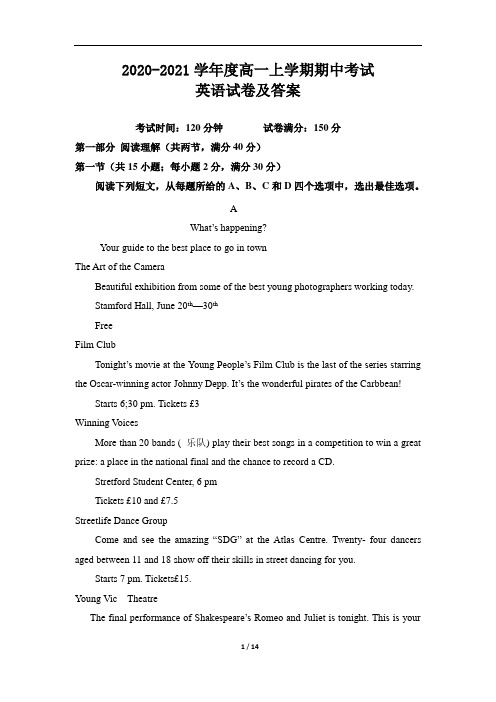
2020-2021学年度高一上学期期中考试英语试卷及答案考试时间:120分钟试卷满分:150分第一部分阅读理解(共两节,满分40分)第一节(共15小题;每小题2分,满分30分)阅读下列短文,从每题所给的A、B、C和D四个选项中,选出最佳选项。
AWhat’s happening?Your guide to the best place to go in townThe Art of the CameraBeautiful exhibition from some of the best young photographers working today.Stamford Hall, June 20th—30thFreeFilm ClubTonight’s movie at the Young People’s Film Club is the last of the series starring the Oscar-winning actor Johnny Depp. It’s the wonderful pirates of the Carbbean!Starts 6;30 pm. Tickets £3Winning V oicesMore than 20 bands ( 乐队) play their best songs in a competition to win a great prize: a place in the national final and the chance to record a CD.Stretford Student Center, 6 pmTickets £10 and £7.5Streetlife Dance GroupCome and see the amazing “SDG” at the Atlas Centre. Twenty- four dancers aged between 11 and 18 show off their skills in street dancing for you.Starts 7 pm. Tickets£15.Young Vic TheatreThe final per formance of Shakespeare’s Romeo and Juliet is tonight. This is yourlast chance to see this wonderful play. Don’t miss it.Starts 8 pm. Tickets £9, £7 and £5.5021. What can we learn about the Art of the Camera?A. It lasts half a monthB. It shows some old photosC. It is open to the public for freeD.It is held by 24 young artists22. Where can you watch street dancing ?A. At the Atlas CentreB.In Stamford HallC. At Young Vic TheatreD. At Stretford Student Centre23. If John only has £4, what could he do?A. See Romeo and JulietB.Watch Winning V oicesC.Watch Streetlife Dance GroupD. See Pirates of the CaribbeanBA long time ago, there was a farmer who had ten donkeys(驴). One evening, after a long day of hard work, the farmer returned home with the donkeys and began to tie them to the stakes(桩). When he finished nine donkeys, he found that the tenth rope was gone.What now? He could not let the last donkey run around all night. It would surely run away. Suddenly, he saw that, under a tree, there was a monk(和尚). The farmer ran to the monk and asked for voice. The monk said, “The only thing you have to do to the tenth donkey is make the movements(动作) you would have made with a rope in your hands. Pretend (假装) to tie the donkey. That’s all.”The farmer returned to the tenth donkey, pretended to fasten(拴紧) a rope around its neck and then to tie the rope to a stake. He then entered his little house, half trusting the monk’s advice, half worried that his donk ey would run away in the middle of the night.When he went outside very early the next morning, all the donkeys were still standing nicely next to their stakes, even the tenth one. The farmer untied the donkeys and wanted to take them to the field. But to his surprise, donkey number ten refused to move an inch. The farmer pulled and shouted but the animal just didn’t move.Suddenly, the farmer thought of what he had done to the donkey the night before. With a great “ah ha”, he returned to donkey number ten,and just after a simple movement the donkey happily walked with him to the field.24. What was the farmer’s problem when he tied the donkey?A. He needed one more rope.B. The tenth stake was gone.C. The tenth donkey ran away.D. He had left a rope in the field.25. Following the monk’s advice, what did the farmer do?A. He pretended to tie the tenth donkey.B.He went to sleep straight.C. He watched the tenth donkey all night.D. He tied the tenth donkey to the ninth stake.26. What did the farmer find in the next morning?A. All the donkeys were gone.B. The tenth donkey didn’t run away.C. Donkey number ten was running around.D. The donkeys went to the field by themselves.27. What does the underlined part“ a simple movement”refer to?A. Taking away the tenth stake.B. Pretending to untie the donkey.C. Pretending to cut the tenth rope.D. Trying the tenth donkey with a real rope.CFirst Lady Michelle Obama is a big fan of volunteering. V olunteering means working for free to help someone else. Mrs. Obama says volunteering is very important. “It should be part of everyone’s life, ” she says.Many teens agree. They say that helping others feels great and makes a difference. These days, more teens volunteer than work for pay. Teens clean up parks, walk dogs at animal shelters , visit the elderly and more.Some cities ---- including Seatle, Chicago, and Washingtong,D.C. ----require high school students to volunteer. Students must volunteer in order to graduate. Thestudent volunteers learn new skills and help their communities .Many parents are in favor of the idea ---- they say volunteering helps teens build job skills. But most teens don’t want to be forced to volunteer. They say they are busy. And they say voluntee ring is only fun if it’s a choice.Read both sides of the debate and decide.YESV olunteering can help teens get into college or get a job.Many cities and towns need help. V olunteers can help keep important programs going.Not all teens will volunteer if it isn’t required. Schools should repuire students to do all they can to get ready for adult life.NOMost teens are already very busy with classes, homework, jobs and sports. Forcing them to do more isn’t fair.It should be up to each person. Helping out doesn’t feel as good if you have to do it.Finding a volunteer job isn’t always easy. Students shouldn’t be kept from graduating because of something they can’t control.28. The writer mentions Michelle Obama in order to ,A. explain what volunteering isB. show she enjoys volunteeringC. tell what she does for the US D . introduce the topic of the text29. According to the text, in Chicago, .A. more people would rather work for payB. finding a volunteer job is quite easyC. volunteering is a must for high school studentsD. college students have to volunteer before graduation30. The underlined part “are in favor of “in the text means” .A. dropB. developC. likeD.catch31. Which question does the text mainly discuss?A. Is volunteering good for students?B.Which volunteer jobs shouldstudents do?C. What is the best time to volunteer?D. Should students be required to volunteer?DCoffee is an important part of Italian culture and since arriving here over six months ago, I have drunk a lot of it!Of course, coffee is also very popular in the UK but coffee culture in Italy is completely different. In Italy, when you order a coffee in a cafe or bar(酒吧), you are served with a tiny, bitter espresso. This is “normal (正常的) coffee” for Italians and they are not so interested in the huge coffees that we drink in the UK. If you want more than one sip(小口) of coffee in Italy, lungo is a good choice. In addition, while takeaway coffee is quite popular among Brits, it is not very common at all in Italy. Generally, Italians prefer to drink their tiny coffees while standing at the bar and, for many, this short break is an important part of their day.Usually, breakfast in a bar in Italy -includes a coffee and a pastry (酥皮糕点). Cappuccinos are very popular at breakfast time and, for me, a creamy cappuccino and a pastry with chocolate is the perfect way to start the day.Finally, I have found that coffee in Italy, such as espresso or macchiato (an espresso with a drop of milk), is so much cheaper than coffee in the UK. They are small, of course, but this means that in Italy it is possible to go out for coffee every day without breaking the bank.32.How is Paragraph 2 mainly developed?A.By time.B. By space.C. By comparisonD.By example.33.Which coffee will you get in Italy if you order one without special instructions?A. Espresso.B. Lungo.C. Cappuccino.D. Macchiato.34.What can we learn about the coffee culture in Italy?A.Takeaway coffee is very popular among Italians.B.Italians are very often seen drinking huge coffees.C.Few Italians take short breaks from work for coffee.D.Coffees are often served along with pastries during breakfasts.35.What does the author think of Italian coffee?A.She loves its bitter taste.B.It is too expensive for her.C.The cup it is served in is too small.D.It is a good choice for breakfast.第二节(共5小题;每小题2分,满分10分)根据短文内容,从短文后的选项中选出能填入空白处的最佳选项。
2020-2021学年度高一上学期期中考试英语试卷及答案(含五套题)

2020-2021学年度高一上学期期中考试英语试卷及答案考试时间:120分钟试卷满分:150分第一部分阅读理解(共两节,满分40分)第一节(共15小题;每小题2分,满分30分)阅读下列短文,从每题所给的A、B、C和D四个选项中,选出最佳选项。
AWhat’s happening?Your guide to the best place to go in townThe Art of the CameraBeautiful exhibition from some of the best young photographers working today.Stamford Hall, June 20th—30thFreeFilm ClubTonight’s movie at the Young People’s Film Club is the last of the series starring the Oscar-winning actor Johnny Depp. It’s the wonderful pirates of the Carbbean!Starts 6;30 pm. Tickets £3Winning V oicesMore than 20 bands ( 乐队) play their best songs in a competition to win a great prize: a place in the national final and the chance to record a CD.Stretford Student Center, 6 pmTickets £10 and £7.5Streetlife Dance GroupCome and see the amazing “SDG” at the Atlas Centre. Twenty- four dancers aged between 11 and 18 show off their skills in street dancing for you.Starts 7 pm. Tickets£15.Young Vic TheatreThe final per formance of Shakespeare’s Romeo and Juliet is tonight. This is yourlast chance to see this wonderful play. Don’t miss it.Starts 8 pm. Tickets £9, £7 and £5.5021. What can we learn about the Art of the Camera?A. It lasts half a monthB. It shows some old photosC. It is open to the public for freeD.It is held by 24 young artists22. Where can you watch street dancing ?A. At the Atlas CentreB.In Stamford HallC. At Young Vic TheatreD. At Stretford Student Centre23. If John only has £4, what could he do?A. See Romeo and JulietB.Watch Winning V oicesC.Watch Streetlife Dance GroupD. See Pirates of the CaribbeanBA long time ago, there was a farmer who had ten donkeys(驴). One evening, after a long day of hard work, the farmer returned home with the donkeys and began to tie them to the stakes(桩). When he finished nine donkeys, he found that the tenth rope was gone.What now? He could not let the last donkey run around all night. It would surely run away. Suddenly, he saw that, under a tree, there was a monk(和尚). The farmer ran to the monk and asked for voice. The monk said, “The only thing you have to do to the tenth donkey is make the movements(动作) you would have made with a rope in your hands. Pretend (假装) to tie the donkey. That’s all.”The farmer returned to the tenth donkey, pretended to fasten(拴紧) a rope around its neck and then to tie the rope to a stake. He then entered his little house, half trusting the monk’s advice, half worried that his donk ey would run away in the middle of the night.When he went outside very early the next morning, all the donkeys were still standing nicely next to their stakes, even the tenth one. The farmer untied the donkeys and wanted to take them to the field. But to his surprise, donkey number ten refused to move an inch. The farmer pulled and shouted but the animal just didn’t move.Suddenly, the farmer thought of what he had done to the donkey the night before. With a great “ah ha”, he returned to donkey number ten,and just after a simple movement the donkey happily walked with him to the field.24. What was the farmer’s problem when he tied the donkey?A. He needed one more rope.B. The tenth stake was gone.C. The tenth donkey ran away.D. He had left a rope in the field.25. Following the monk’s advice, what did the farmer do?A. He pretended to tie the tenth donkey.B.He went to sleep straight.C. He watched the tenth donkey all night.D. He tied the tenth donkey to the ninth stake.26. What did the farmer find in the next morning?A. All the donkeys were gone.B. The tenth donkey didn’t run away.C. Donkey number ten was running around.D. The donkeys went to the field by themselves.27. What does the underlined part“ a simple movement”refer to?A. Taking away the tenth stake.B. Pretending to untie the donkey.C. Pretending to cut the tenth rope.D. Trying the tenth donkey with a real rope.CFirst Lady Michelle Obama is a big fan of volunteering. V olunteering means working for free to help someone else. Mrs. Obama says volunteering is very important. “It should be part of everyone’s life, ” she says.Many teens agree. They say that helping others feels great and makes a difference. These days, more teens volunteer than work for pay. Teens clean up parks, walk dogs at animal shelters , visit the elderly and more.Some cities ---- including Seatle, Chicago, and Washingtong,D.C. ----require high school students to volunteer. Students must volunteer in order to graduate. Thestudent volunteers learn new skills and help their communities .Many parents are in favor of the idea ---- they say volunteering helps teens build job skills. But most teens don’t want to be forced to volunteer. They say they are busy. And they say voluntee ring is only fun if it’s a choice.Read both sides of the debate and decide.YESV olunteering can help teens get into college or get a job.Many cities and towns need help. V olunteers can help keep important programs going.Not all teens will volunteer if it isn’t required. Schools should repuire students to do all they can to get ready for adult life.NOMost teens are already very busy with classes, homework, jobs and sports. Forcing them to do more isn’t fair.It should be up to each person. Helping out doesn’t feel as good if you have to do it.Finding a volunteer job isn’t always easy. Students shouldn’t be kept from graduating because of something they can’t control.28. The writer mentions Michelle Obama in order to ,A. explain what volunteering isB. show she enjoys volunteeringC. tell what she does for the US D . introduce the topic of the text29. According to the text, in Chicago, .A. more people would rather work for payB. finding a volunteer job is quite easyC. volunteering is a must for high school studentsD. college students have to volunteer before graduation30. The underlined part “are in favor of “in the text means” .A. dropB. developC. likeD.catch31. Which question does the text mainly discuss?A. Is volunteering good for students?B.Which volunteer jobs shouldstudents do?C. What is the best time to volunteer?D. Should students be required to volunteer?DCoffee is an important part of Italian culture and since arriving here over six months ago, I have drunk a lot of it!Of course, coffee is also very popular in the UK but coffee culture in Italy is completely different. In Italy, when you order a coffee in a cafe or bar(酒吧), you are served with a tiny, bitter espresso. This is “normal (正常的) coffee” for Italians and they are not so interested in the huge coffees that we drink in the UK. If you want more than one sip(小口) of coffee in Italy, lungo is a good choice. In addition, while takeaway coffee is quite popular among Brits, it is not very common at all in Italy. Generally, Italians prefer to drink their tiny coffees while standing at the bar and, for many, this short break is an important part of their day.Usually, breakfast in a bar in Italy -includes a coffee and a pastry (酥皮糕点). Cappuccinos are very popular at breakfast time and, for me, a creamy cappuccino and a pastry with chocolate is the perfect way to start the day.Finally, I have found that coffee in Italy, such as espresso or macchiato (an espresso with a drop of milk), is so much cheaper than coffee in the UK. They are small, of course, but this means that in Italy it is possible to go out for coffee every day without breaking the bank.32.How is Paragraph 2 mainly developed?A.By time.B. By space.C. By comparisonD.By example.33.Which coffee will you get in Italy if you order one without special instructions?A. Espresso.B. Lungo.C. Cappuccino.D. Macchiato.34.What can we learn about the coffee culture in Italy?A.Takeaway coffee is very popular among Italians.B.Italians are very often seen drinking huge coffees.C.Few Italians take short breaks from work for coffee.D.Coffees are often served along with pastries during breakfasts.35.What does the author think of Italian coffee?A.She loves its bitter taste.B.It is too expensive for her.C.The cup it is served in is too small.D.It is a good choice for breakfast.第二节(共5小题;每小题2分,满分10分)根据短文内容,从短文后的选项中选出能填入空白处的最佳选项。
2020-2021学年度高一上学期期中考试英语试卷及答案(含两套题)
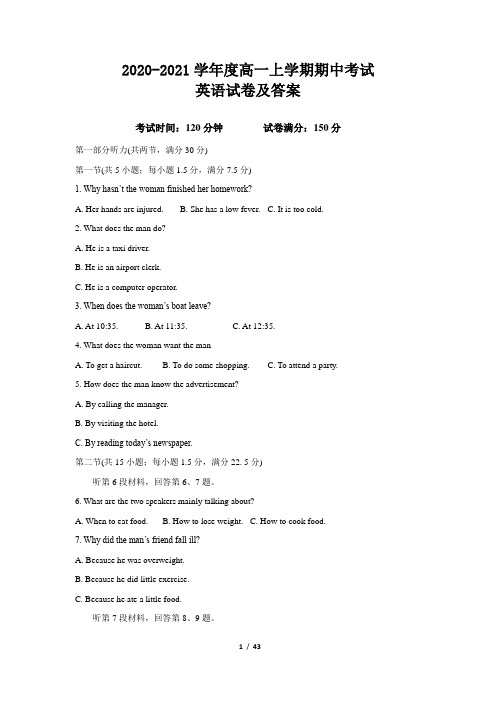
2020-2021学年度高一上学期期中考试英语试卷及答案考试时间:120分钟试卷满分:150分第一部分听力(共两节,满分30分)第一节(共5小题;每小题1.5分,满分7.5分)1. Why hasn’t the woman finished her homework?A. Her hands are injured.B. She has a low fever.C. It is too cold.2. What does the man do?A. He is a taxi driver.B. He is an airport clerk.C. He is a computer operator.3. When does the woman’s boat leave?A. At 10:35.B. At 11:35.C. At 12:35.4. What does the woman want the manA. To get a haircut.B. To do some shopping.C. To attend a party.5. How does the man know the advertisement?A. By calling the manager.B. By visiting the hotel.C. By reading today’s newspaper.第二节(共15小题;每小题1.5分,满分22. 5分)听第6段材料,回答第6、7题。
6. What are the two speakers mainly talking about?A. When to eat food.B. How to lose weight.C. How to cook food.7. Why did the man’s friend fall ill?A. Because he was overweight.B. Because he did little exercise.C. Because he ate a little food.听第7段材料,回答第8、9题。
江苏省苏州陆慕高级中学2020届高三上学期期中考试英语试卷 PDF版含答案
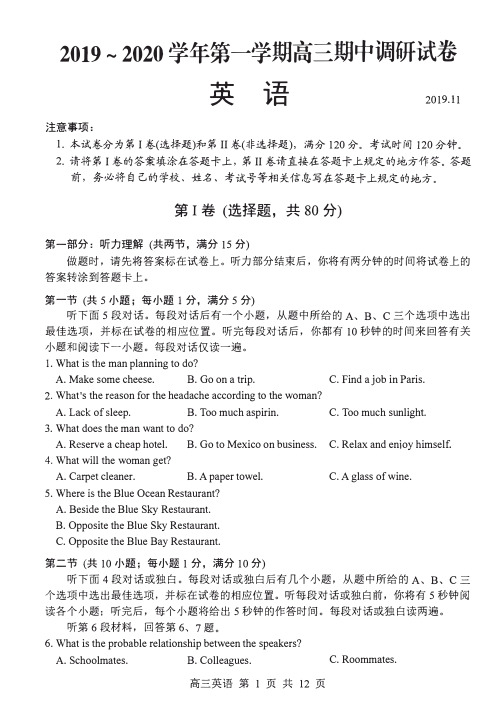
2019~2020学年第一学期高三期中调研试卷英语2019.11 注意事项:1.本试卷分为第I卷(选择题)和第II卷(非选择题),满分120分。
考试时间120分钟。
2.请将第I卷的答案填涂在答题卡上,第II卷请直接在答题卡上规定的地方作答。
答题前,务必将自己的学校、姓名、考试号等相关信息写在答题卡上规定的地方。
第I卷(选择题,共80分)第一部分:昕力理解(共两节,满分15分)做题时,请先将答案标在试卷上。
听力部分结束后,你将有两分钟的时间将试卷上的答案转涂到答题卡上。
第一节(共5小题;每小题l分,满分5分)听下面5段对话。
每段对话后有一个小题,从题中所给的A、B、C三个选项中选出最佳选项,并标在试卷的相应位置。
听完每段对话后,你都有10秒钟的时间来回答有关小题和阅读下一小题。
每段对话仅读一遍。
1.What is the man planning to do?A.Make some cheese.B.Go on a trip.C.Find a job in Paris.2.What’s the reason for the headache according to the woman?ck of sleep.B.Too much aspirin.C.Too much sunlight.3.What does the man want to do?A. Reserve a cheap hotel.B.Go to Mexico on business.C. R elax and enioy himself.4.What will the woman get?A.Carpet cleaner.B. A paper towel.C. A glass of wine.5.Where is the Blue Ocean Restaurant?A.Beside the Blue S均Restaurant.B.Opposite the Blue Sky Restaurant.C.Opposite the Blue Bay Restaurant.第二节(共10小题;每小题1分,满分10分)听下面4段对话或独白。
- 1、下载文档前请自行甄别文档内容的完整性,平台不提供额外的编辑、内容补充、找答案等附加服务。
- 2、"仅部分预览"的文档,不可在线预览部分如存在完整性等问题,可反馈申请退款(可完整预览的文档不适用该条件!)。
- 3、如文档侵犯您的权益,请联系客服反馈,我们会尽快为您处理(人工客服工作时间:9:00-18:30)。
相城区陆慕高级中学2020〜2021学年第一学期期中试卷高一英语2020.11注意事项:1. 本试卷分为第I卷(选择题)和第Ⅱ卷(非选择题),满分150分。
考试时间120分钟。
2. 请将第[卷的答案填涂在答题卡上,第Ⅱ卷请直接在答题卡上规定的地方作答。
答题前,学生务必将自己的学校、姓名、调研序列号等相关信息写在答题卡上规定的地方。
第I卷选择题(共95分)第一部分听力(共两节,满分30分)做题时,先将答案标在试卷上。
录音内容结束后,你将有两分钟的时间将试卷上的答案转涂到答题卡上。
第一节(共5小题;每小题1.5分,满分7・5分)听下面5段对话。
每段对话后有一个小题,从题中所给的A、C三个选项中选出最佳选项。
听完每段对话后,你都有10秒钟的时间来回答有关小题和阅读下一小题。
每段对话仅读一遍。
1. What is the relationship between the two speakers?A. Strangers.B. Father and daughter.C. Teacher and student.2. Where are the two speakers?A. In a cafeB. On campus.C. In a park.3. When did Jack finish his homework?A. At 10:30.B. At 7:30.C. At 8:00.4. Why does the woman just order a cup of coffee?A- Because she is watching her diet.B. Because only coffee is recommended.1C. Because she is not interested in desserts.5. What is the dog’s name?A. Dennis.B. Nancy.C. Lucy.第二节(共15小题;'每小题1.5分,满分22.5分)听下面5段对话或独白。
每段对话或独白后有几个小题,从题中所给的A、B、C三个选项中选出最佳选项,并标在试卷的相应位置。
听每段对话或独白前,你将有时间阅读各个小题,每小题5秒钟;听完后,各小题将给出5秒钟的作答时间。
每段对话或独白读两遍。
听第6段材料,回答第6至7题。
6. What does the man expect his daughter to do?A. Sell ice creams.B. Work hard at whatever she loves.C. Have a stable job.7. What job was little Tina interested, in?A. Going down a water slide.B. Playing in an amusement park.C. Selling ice creams.听第7段材料,回答第8至9题。
8. Why does the woman feel sorry? 'A. Because she used the man's computer without permission.B. Because she didn’t save the man's recent designs.C. Because she didn't pay for the man's dinner.9. What do you think of the man?A. Thoughtful and humorous,B. Patient and gentle.C. Energetic and wise.听第8段材料,回答第10至12题。
10. Why doesn't Liz want to be a nurse?1A. Because she loves cooking better.B. Because she faints when seeing blood.C. Because she is not a good listener.11. What is Liz good at? -A. Treating the injured.B. Having conversations.C. Listening to people.12. What suggestion does Liz get from the man?A. What job suits her.B. How to cook better.C. How to get along well with others.听第9段材料,回答第13至16题。
13. What part of the test did the woman find challenging?A. Letter writing.B. Grammar,C. Listening14. Who finished the test paper in the end?A. Sara.B. JeffC. Neither.15. What test are they going to take next?A. Physics.B. Chemistry-.C. Geography.16. What do you think Sara needs to improve later on?A. Managing her time.B. Writing letters. C” Making fewer mistakes.听第10段材料,回答第17至20题”17. At what age can a boy join the gym?A. 12.B. 11.C. Not mentioned.18 If you go to the gym on Saturday, when do you need to leave?1A. 9:00 P.M.B. 8:30 P.M.C. 8: 00 P.M.19. Where are you supposed to keep your personal belongings?A. On the gym floor.B. In the hallway.C. In your locker.20. What is right about the gym?A. The trainers of the gym are professional.B. The gym makes no changes in its operation during the pandemic.C. After being used, the gym equipment will be put back by the staff.第二部分阅读(共两节,满分50分)第一节(共15小题;每小题2.5分,满分375分)阅读下列短文,从每题所给的A、B、C和D四个选项中,选出最佳选项。
AMadame College Swimming PoolsMadame College of Arts has one 50m (Olympic-sized) pool with a depth of 2m throughout, and one 25m pool with a lm shallow end and a 4m deep end. Both pools may be used by the general public at certain times.50m PoolThe pool is often used for classes, but the general public may use two lanes (泳道)for lane swimming at the following times.Monday: 06:30—11:30 and 19:00—21:00Tuesday: 06:30—11:30 and 1&00—21:00Wednesday: 06:30-13:30 and 17:30-21:30Thursday: 06:30—13:30Friday: 06:30-13:30Weekends: 09:00—17:00 ,1Children under the age of 14 must be accompanied by an adult.Please note that during College holidays, these times will be different. Call 04837 393560 for up-to-date information.25m PoolThe 25m pool is available for recreational (non-lane) swimming from 07:00—09:00 and 12:30— 13:30 on weekdays, and 10:00—16:00 on Saturdays.Children aged 12 and under must be accompanied.We regret that the 25m pool will be closed for redecoration between 21st July and 18th August.The men' s changing rooms will be closed for the week beginning 19th August, and the women's changing rooms will be closed the following week. Alternative (可选用的)changing rooms will be made available. We5re sony for this.21. At what time can the general public use the 50m pool on Sundays?A. 21:00. B-. 18:00. C. 13:30. D. 06:30.22. What do we know about the 50m pool?A. It's 4 metres deep.B. It's usually used for teaching swimming.C. It's unsuitable for children under 14.D. If s unavailable during College holidays.23. The 25m pool will be closed ______ .A. for a weekB. on 26th AugustC. on 19th AugustD. for about a monthBLosing a baby tooth can be fun for a kid. You can put it under your pillow and look forward to finding some money there in the morning. And then you can watch your new permanent (永 tooth grow in its place.But if a permanent tooth fells out, that's a problem. There isn't another one under the gum (齿龈)that can replace it. Unfortunately, this happens to some older people. And if. permanent teeth fall out or need to be pulled, an older person might need dentures.Dentures, known as false teeth, are a set of replacement teeth for any teeth that are missing。
